Crude drugs
Crude drugs and ethnomedicines
According to the Japanese Pharmacopoeia, crude drug is a whole or a part of medicinal plants, animals, or minerals that are used for remedy as a fresh material or after simple processing.
Each ethnic group has own traditional medicine, which are also called “folk medicine.” Traditional and folk medicine are called ethno-medicine as both have been developed and used in ethnic groups of the world.
Kan-yaku
Crude drugs used in traditional Chinese medicine are called Kan-yaku (literally Chinese drugs) in Japanese.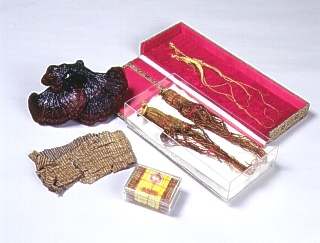
Both Kan-yaku and Wa-yaku (Japanese drugs) are extensively used in Japanese kampo medicine.Crude drugs used in Japanese Kampo medicine, which was derived from Chinese traditional medicine and developed in Japan, are called Wakan'yaku, which is a coined word formed by joining Wa-yaku and Kan-yaku.
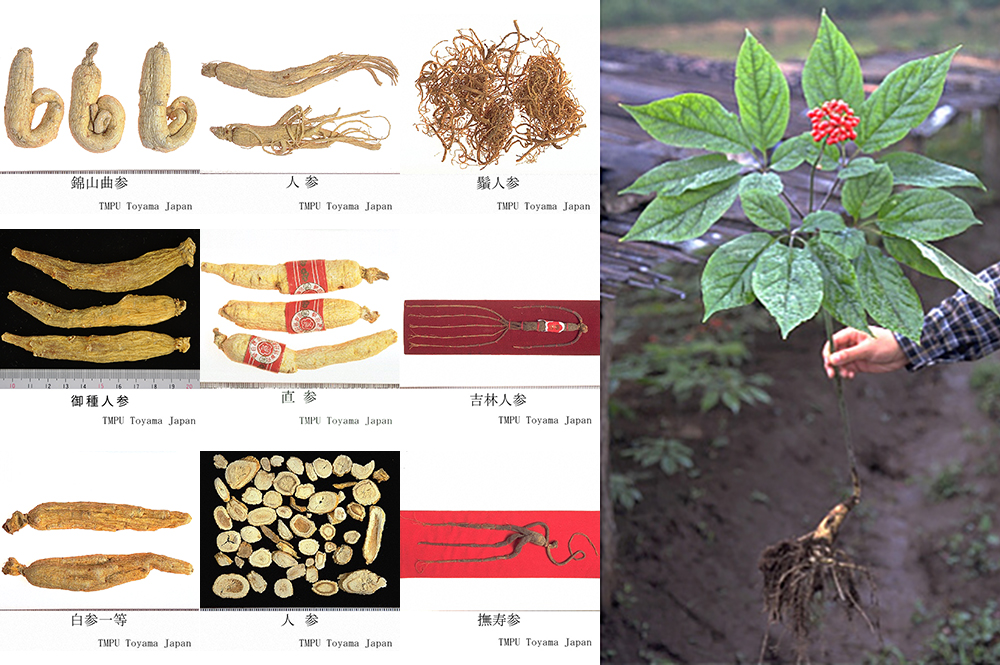 Ginseng is a representative of Wakan-yaku and one of the most highly prized drugs since ancient times. The major benefits are increased appetite, enhanced vitality, and improved Qi (vital energy). It is the dried root of Panax ginseng C.A. Meyer (Arariaceae). Although the Korean Peninsula is famous for its ginseng production, it was successfully cultivated in Japan during the Edo period. Nowadays, Nagano, Fukushima, and Shimane prefectures continue ginseng production.
Ginseng is a representative of Wakan-yaku and one of the most highly prized drugs since ancient times. The major benefits are increased appetite, enhanced vitality, and improved Qi (vital energy). It is the dried root of Panax ginseng C.A. Meyer (Arariaceae). Although the Korean Peninsula is famous for its ginseng production, it was successfully cultivated in Japan during the Edo period. Nowadays, Nagano, Fukushima, and Shimane prefectures continue ginseng production.Wa-yaku
Japanese traditional medicines (Wa-yaku) have been used in Japan for a long time. Their composition and use have been transferred between generations orally.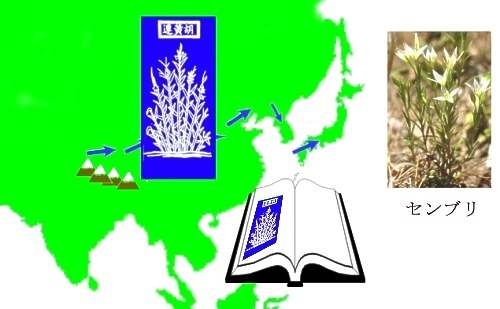 Semburi (Swertia Herb), Gen'noshoko (Geranium Herb), and Dokudami (Houttuyinia Herb) are some of the examples of Wa-yaku.
Others, such as Angelica root and Peony root are used in Kampo medicine as well.
Semburi, which belongs to Gentianaceae family, played an important role in a history of folk and traditional medicines in Toyama. It was developed as a substitute for Picrorrhiza rhizome, which is used as one of the ingredients of ''Hangontan," a typical traditional medicine in Toyama in the 16th century (the end of the Muromachi period). Picrorrhiza rhizome is derived from a member of Scrophulariaceae family, found in the Himalayas; its Indian name is Katuki. It is used for treating acute hepatitis and bronchitis.
Semburi (Swertia Herb), Gen'noshoko (Geranium Herb), and Dokudami (Houttuyinia Herb) are some of the examples of Wa-yaku.
Others, such as Angelica root and Peony root are used in Kampo medicine as well.
Semburi, which belongs to Gentianaceae family, played an important role in a history of folk and traditional medicines in Toyama. It was developed as a substitute for Picrorrhiza rhizome, which is used as one of the ingredients of ''Hangontan," a typical traditional medicine in Toyama in the 16th century (the end of the Muromachi period). Picrorrhiza rhizome is derived from a member of Scrophulariaceae family, found in the Himalayas; its Indian name is Katuki. It is used for treating acute hepatitis and bronchitis.
Kampo formula
Each Kampo formulation is made up of several Chinese and/or Japanese crude drugs according to classical traditional Chinese medicine and Kampo medicine. One such formulation well known in Japan is Kakkonto (葛根湯).
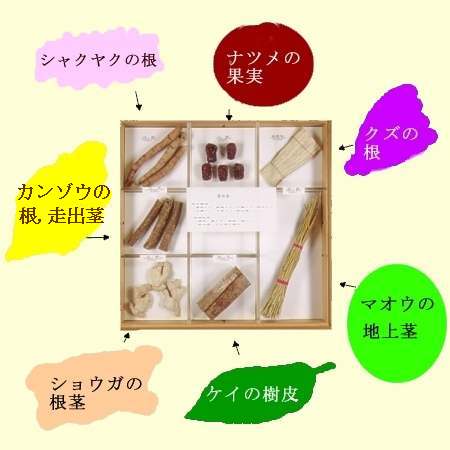 Kampo formulation
Each Kampo formulation is made up of several Chinese and/or Japanese crude drugs according to classical traditional Chinese medicine and Kampo medicine. One such formulation well known in Japan is Kakkonto (葛根湯).
Kampo formulation
Each Kampo formulation is made up of several Chinese and/or Japanese crude drugs according to classical traditional Chinese medicine and Kampo medicine. One such formulation well known in Japan is Kakkonto (葛根湯).
This formulation is listed in Shan Han Lun, written in later Han Dynasty and is used to treat symptoms of initial stages of common cold: headache, chills, acute fever, stiff neck and shoulders and painful tension of the muscles of these areas. Ingredients for Kakkonto formulation are: Kakkonto 8(4)g, Ephedra herb 4(3)g, Jujube fruit 4(3)g, Cinnamon bark: 3(2)g, Peony root: 3(2)g, Glycyrrhiza 2g, and Ginger: 1g.
Ayurvedic medicines
Traditional Indian medicine is called "Ayurveda". "Ayus" means life and "veda" means knowledge or science. Therefore, it is translated as "knowledge of life" or "science of life." It pursues not only curing diseases, but also understanding what is and is not beneficial to healthy and happy life.
HARITAKI 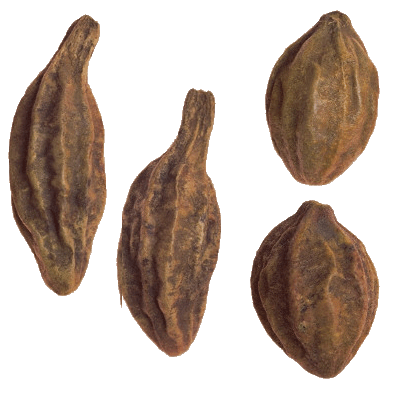 is a representative Ayurvedic crude drug. It was introduced from India to Japan via China (Chinese name: 詞子、詞梨勒). The term can be seen in Buddhist doctrines. It is derived from the fruit of myrobalan (Terminalia Chebula), and is used as a tonic in India and as an astringent, anti-diarrheal and anti-tussive in China.
is a representative Ayurvedic crude drug. It was introduced from India to Japan via China (Chinese name: 詞子、詞梨勒). The term can be seen in Buddhist doctrines. It is derived from the fruit of myrobalan (Terminalia Chebula), and is used as a tonic in India and as an astringent, anti-diarrheal and anti-tussive in China.

